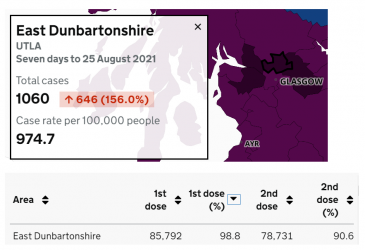Just on the UK, and as others noted our two situations cannot be directly compared as our and experiences have been different, and are currently different. Plus it is now Delta at play and not Alpha, and so it is what has happened recently that is most relevant.
However some seem to be of the belief that our cases (infections) will go down post 80% and on opening up. However, I am not sure why? Cases/infections in Australia have been very low due out in the main strict measures combined with out bubble. So we are currently well below what will probably become the norm.
But once people are freely allowed to mix with active Covid infections in the community it should mean that cases/infections will go up and not down.
Vaccines minimise the severe adverse events of Covid. They do not stop transmission. They minimise the effects of what Covid does once it enters your body, but Covid will keep causing upper respiratory problems where the vaccine will not readily assist, and so Covid will still replicate and infect others. Plus the unvaccinated will also of course spread the virus.
If we just ignore the differences between Australia and the UK for the moment, crudely put at present in the UK about 30 thousand cases per day (it seems to be on the rise), and over one hundred deaths per day.
Adjusting for population that is in Australia about 13 thousand per day, and say 50 deaths per day. Even for just NSW that would be 4000 per day, and 16 deaths per day. The unknown is whether this drops off after some time, or whether it becomes like the flu where mutations keep causing new Cases each year. So it could be like a really, really bad flu season for one year only, or it may keep rolling along year after year. One extra disadvantage though is that it would seem that the health resources required to treat Covid patients may be substantially more than flu patients. If so that is going to requite an ongoing beefed up health system.
Now yes this will be up and down, but the vast majority of the Australian population has not yet been exposed to Covid. Once we start to freely mix, including worldwide, then eventually everyone will get exposed to Covid. How quick that will be is anyone's guess, but it will quite probably spread within Australia quicker than it has to date.
Outcomes will be much worse for the unvaccinated, subject age and comorbidities, but even the fit and vaccinated are still going to have upper respiratory problems and while not as severe for some they will have health issues from it.
Now we will open up, but the price of that even with high vaccination rates is more cases and adverse health events than we have now as Covid will be freely mixing within our population. The plus side are the many economic and social benefits that we will gain.

 www.theguardian.com
www.theguardian.com

















